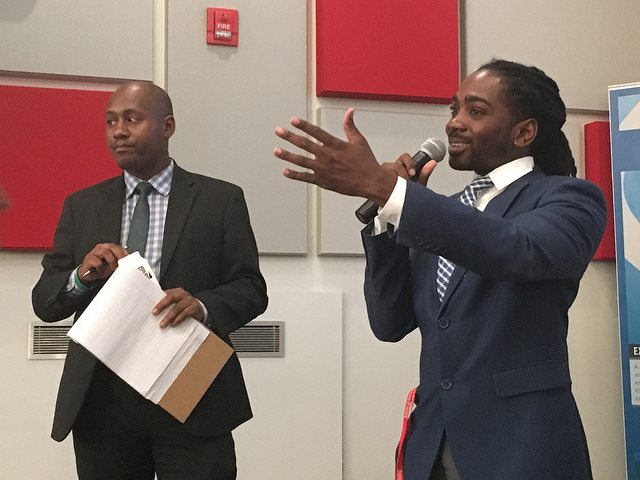The D.C. Council unanimously approved the $13.8 billion fiscal year 2018 budget at a final vote on June 13, including allocations of funding for Ward 8 initiatives like a community-owned and a nonprofit grocery store, grants for local entrepreneurs and a new recreation center. On May 30, the council voted to approve the mayor’s proposal to provide $15 million for a recreation center in Congress Heights and accelerate allocation for $11.9 million to modernize the Anacostia Recreation Center over six years. The center will empower residents and offer job training, said Ward 8 Councilmember Trayon White, Sr. at a June 8 community meeting. The emergency meeting was organized to address Ward 8 residents’ disappointment in the D.C. Council’s budget before the second and final vote occurred.
Councilmember White and Chairman Phil Mendelson hosted the meeting at the RISE Demonstration Center in Southeast D.C. Ward 8 residents in attendance said the budget did not supply enough money to fund programs such as the Neighborhood Engagement Achieves Results Act and housing initiatives like vouchers and rapid rehousing, a time-limited subsidized housing lease.
The council’s budget dedicated almost $2.1 million for the NEAR Act to establish the Office of Neighborhood Safety and Engagement with 11 employees and a Community Crime Prevention team. The budget does not mention the office’s stipend-intervention program designed to incentivize participants or provide funding for the 36 total employees suggested for the office in the mayor’s proposed budget amendments.
Black Lives Matter D.C. sent a petition signed by 74 coalitions to D.C. Council members the next day demanding for the NEAR Act to be fully funded.
In the legislative meeting for the final vote, Chairman Phil Mendelson said that after working with the Office of Revenue Analysis, he thinks the NEAR Act will be able to be fully funded after a subject for appropriation is removed. In general, subjects of appropriations are removed once the council and mayor find funding for the legislated program, according to David Umansky, a spokesman for the Office of the Chief Financial Officer.
[Read more: Instead of investing more funding in law enforcement, protestors demand D.C. Council fully fund the NEAR Act]
Erik Salmi, the communications director for Judiciary and Public Safety Committee Chairman Charles Allen, said in an interview after the meeting that the NEAR Act is fully funded aside from providing money for positions connecting behavioral health specialists to police officers that exist elsewhere and a community survey that was already conducted by a separate group. He said the subject of appropriations was removed with the funding in the budget and Mayor Muriel Bowser requested that the funding for the stipend-intervention program go toward the Career Connections job readiness program.
Tensions ran high throughout the Ward 8 meeting after residents said they felt the councilmembers were avoiding answering questions and after dealing for years with unsolved issues, including voucher funding.
“Starting to talk about all of this, literally avoiding questions about vouchers – 40,000 people on vouchers – they shouldn’t be able to sleep at night,” April Goggans said in an interview after the meeting. Goggans is a co-organizer of Black Lives Matter D.C.
The council previously re-allocated $3 million Bowser had proposed for the rapid rehousing program to be used for affordable housing vouchers and permanent supportive housing instead. This was in large part due to testimony about the rapid rehousing program’s lack of success. The Washington Legal Clinic for the Homeless released a report “Set Up To Fail” in May that found only 40 percent of families in rapid rehousing are able to stay their housing by the end of the program.
“I think housing is a crisis right now, and the more … people we have advocating for housing the better outcomes we get,” White said in an interview.
Before the first vote, the Coalition for Nonprofit Housing and Economic Development held their annual advocacy day on May 15 and asked the council to allocate $125 million to the housing production trust fund, $8.5 million for local rent supplement program vouchers and $16 million for the homeowners purchase assistance program.
Mendelson met with the coalition that day but expressed his concerns for a property deal where the Department of Housing and Community Development gave land that was set aside for a nonprofit to two other nonprofit developers.
“As long as we are leaving dollars on the table we are not going to get there,” he said. “We’ve got to be spending every dollar we’ve got.”
The council passed various amendments with the budget, which included restoration of $6.6 million for the streetcar project, Mendelson said.
Some councilmembers praised the budget’s overall efforts to address the housing crisis. But others said funding for rapid rehousing should not have decreased and that funneling money into housing services was just the beginning of fighting a larger problem.
Reginald Black contributed reporting.








